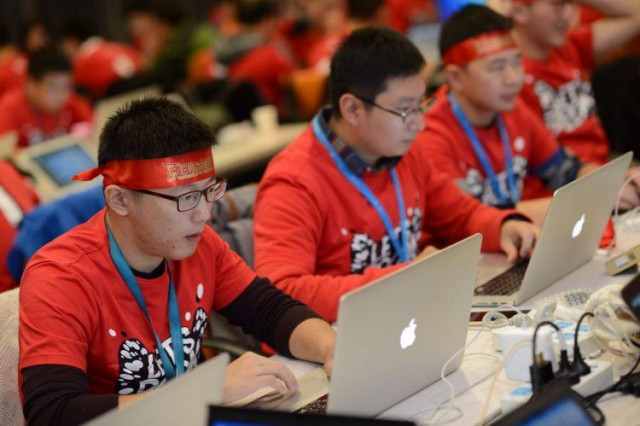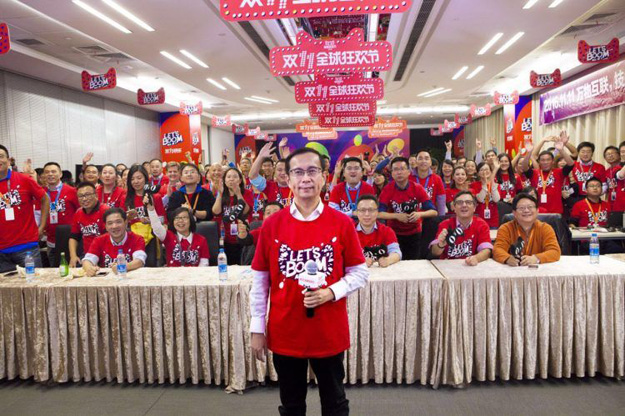How Alibaba Cloud powers the largest shopping holiday in the world
On Singles Day this year, Alibaba sold products worth US$17.5 billion

Alibaba Cloud engineers ready for action. PHOTO COURTESY: ALIBABA GROUP
“It’s the feeling of marching with troops and waging war,” He Yunfei, senior product manager at Alibaba Cloud, tells Tech in Asia. “It’s thrilling.”
Singles Day, originally a kind of anti-Valentine’s day celebrated by single people, happens every year on November 11th. It’s Chinese consumerism on full and terrifying display, where sales – which totalled US$17.5 billion this year – eclipse that of Black Friday and Cyber Monday combined. Started in 2009 by Chinese ecommerce giant Alibaba, Singles Day has since evolved well beyond a day of discounts and price-cuts. The shopping event is preceded by weeks of marketing and advertising campaigns, all culminating in Alibaba’s celebratory gala, a show that counts down to midnight when the numbers start pouring in.
Alibaba breaks records, sells $17.7 billion on Singles Day
“It’s different every year, especially when you stand in front of the screen at midnight,” says Yunfei, describing the scene at Alibaba’s Hangzhou headquarters. “In one moment, a hundred million [RMB] passes over. And then we’ll applaud. Before the sound of our applause even dies away, [sales] reach 1 billion.”
Yunfei has been at Alibaba for eight years, before the cloud computing division was even founded in 2009. He’s in charge of Apsara, Alibaba’s cloud computing platform, and oversees some of the most crucial infrastructure underneath the tech giant’s ecommerce business. During this year’s Singles Day, for example, Alibaba Cloud processed 175,000 transactions and 120,000 payments per second at peak traffic.
But it’s a two-way relationship. When I ask Yunfei what makes Alibaba Cloud capable of such high-volume operations, he mentions the millions of users that Alibaba’s ecommerce business brings in.
“We have good large scale training opportunities for our computing power and big data ability, like Singles Day,” says Yunfei. Alibaba Cloud also services other clients with large volumes of traffic, such as 12360, the train ticket booking website created by the Chinese Rail Ministry. Every year during national holidays, 12360 gets swarmed by tens of millions of users.
“We are continuously training,” he says.
Build it yourself
The main reason why Alibaba Cloud is able to pull off Singles Day is because, like Amazon Web Services and Microsoft Azure, it’s proprietary. It is designed to meet Alibaba’s needs.
“On the public cloud, there’s actually a lot of tools,” says Yunfei. “The biggest difference is that we developed our own system, so we can control every line of code really well.”
That’s important because Taobao has developed into an incredibly complex platform with almost 10,000 applications, says Yunfei. For example, there’s an application that lets users shake their phone to get promoted products during the Singles Day gala. In order to prevent bottlenecks and deal with surging volumes of traffic, Apsara leverages Alibaba Cloud’s own data centres and computing power.
 Victory screen . PHOTO COURTESY: ALIBABA GROUP
Victory screen . PHOTO COURTESY: ALIBABA GROUPAccording to the company, a single Apsara cluster can be scaled up to 10,000 servers with a total of 1 billion gigabytes worth of data storage and analysis capacity.
“Using the buyer’s information, we know their location,” says Yunfei. “Once we know where they are, we will dispatch the best data center to them and have it completed there: all product browsing and selection, some recommendations, and finally completing the transaction.”
“We will calculate this in real-time,” he adds.
Once traffic has been directed to the closest data center, Alibaba Cloud’s server load balancer will distribute requests to different servers. It can do that sequentially, or according to the number of connections the server already has.
Jack Ma just got a job offer from the Indonesian government, but it’s complicated
And it’s not just the company’s software that’s tailored to its business needs – it has custom hardware too, thanks to various partners. In October, Alibaba Cloud signed a partnership with semiconductor company Advanced Micro Devices (AMD) so it can use the latter’s graphics processing chips. Earlier this year, the company also signed a partnership with NVIDIA to create AliCloud HPC, a GPU-accelerated cloud platform.
Integrating Alibaba Cloud’s various custom components – both hardware and software – is ultimately what powers the company’s processing prowess.
In an interview by MIT Technology Review, Zhang Jianfeng, Alibaba’s CTO, revealed that MaxCompute, the company’s cloud batch-data processing platform, processed 1.98 million computation jobs on Singles Day this year. Over the course of that day, over 180 petabytes of data – that’s 180 million gigabytes – was processed using more than 54,000 machines in seven data centers.
“If you […] don’t build it yourself, you wouldn’t have this ability,” explains Yunfei.
Beyond buy-and-sell
Yunfei and his team start preparing for Singles Day a good half year in advance. They imagine what next year and the company’s new technology will look like. They’ll discuss future business models. The company will also set prediction goals in order to estimate traffic. For example, they might aim to increase transactions by 100 or 200 percent.
“When we build the whole system, we’ll use these goals,” explains Yunfei.
But these estimates can never be totally accurate because user behavior is unpredictable, he says. For some example, some users might pay using Huabei, a pay-by-credit service by Alibaba’s financial affiliate, Ant Financial. But others might prefer to pay with Yue Bao, a money market fund also by Ant Financial. It’s impossible to know which application might become the bottleneck, he says.
In addition, user expectations for the platform are rising. “It’s often not as simple as completing a sell-and-buy model of calculation,” says Yunfei. For example, a lot of users want high resolution images now, he says. In addition, Yunfei’s team has had to support live streaming for the first time this year.
 Daniel Zhang, CEO of Alibaba Group. PHOTO COURTESY: ALIBABA GROUP
Daniel Zhang, CEO of Alibaba Group. PHOTO COURTESY: ALIBABA GROUP“When we prepare our systems, we have to continuously do stress testing,” he says. “We have to try our best to mimic the kind of pressure that users will bring [on Singles Day] and see how the system behaves.”
Starting at 4pm the day before Singles Day, Yunfei and his team start watching the system and preparing. Their shift ends at midnight the next day.
Alibaba's new payment system lets virtual reality shoppers pay by nodding
“Our colleagues can really work hard and endure hardship,” he says proudly. There are cots laid out in the room so colleagues can rest when they get tired. Some even fall asleep sitting in their chairs, he adds.
But it’s worth it. The whole team organizes different fun events during the night as well, even exchanging red envelopes with cash. “It makes our otherwise hard life more interesting,” Yunfei says.
“We have a saying at Alibaba,” he continues. “Until you’ve experienced Singles Day, your life as an Alibaba-er is incomplete.”



















COMMENTS
Comments are moderated and generally will be posted if they are on-topic and not abusive.
For more information, please see our Comments FAQ